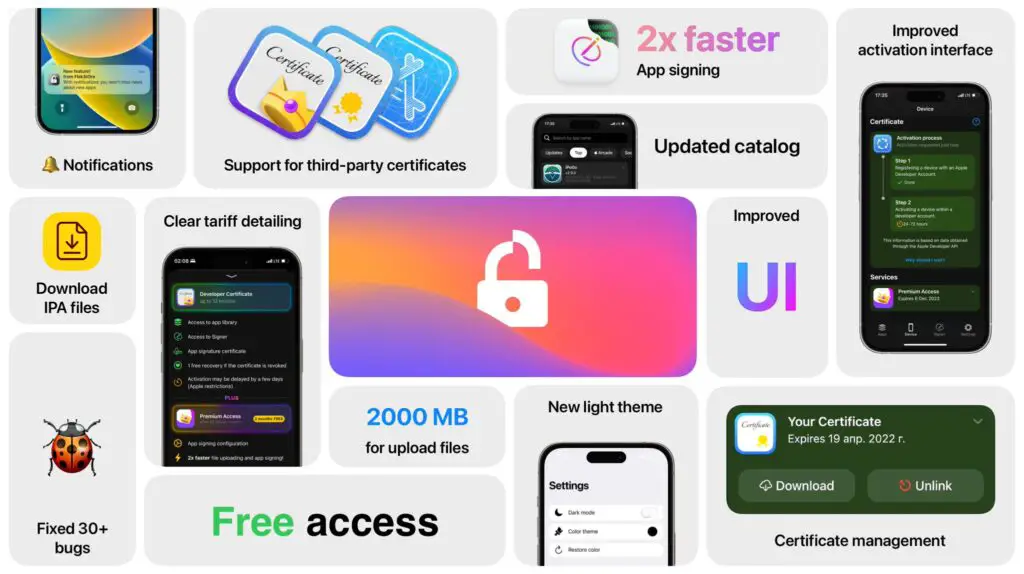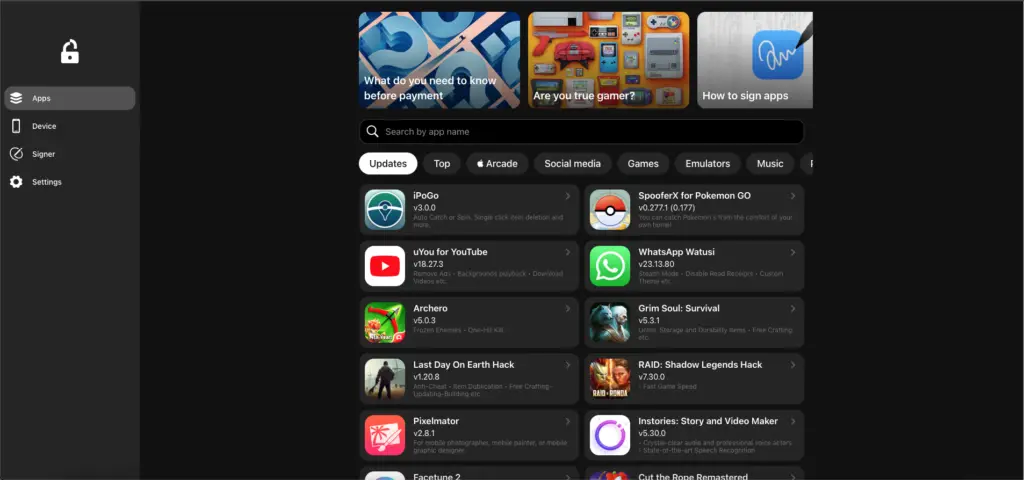Sideloading on iOS is a way to install apps bypassing the official AppStore. In addition, third-party app installation allows you to install not only apps that are not available for some reason in the AppStore but also the ability to install modified games and apps.
The challenges and limitations of Sideloading on iOS. Options for installing apps now:
Previously, third-party installation of apps could only be done using Jailbreak, then the first third-party stores appeared, followed by AltStore and Scarlet.
All of these methods have some nuances:
Apple’s restrictions
Apple is reluctant to open up its system to third-party app installation, citing security as well as technical peculiarities of iOS, as well as Apple is closing off third-party app installation options with each new iOS update.
Jailbreak
An operation not officially supported by Apple that allows access to the file system of several iPhone, iPod, iPad, Apple TV, and Apple Watch models.
This allows you to expand the capabilities of your device, such as support for design themes, tweaks, and installation of applications from third-party sources (which only work with a jailbreak. Example: tweakbox, appcake, cydia, sileo, etc.).
A jailbreak allows full access to the file system of an iPhone, iPod, iPad, or Apple TV, but there is no access to the Apple Watch file system even with a jailbreak. Jailbreak is often not available for modern device models with updated system software.
iOS Developer Certificates
Then what should app developers who want to beta test an app do? You can’t publish an unfinished app to the AppStore, can you? That’s what a Developer Certificate is for. These are official digital certificates from Apple that are issued to iOS app developers.
With a Developer Certificate, you can add any device to this certificate, and then sign any app, which can already be installed on all added devices. During installation, Apple will verify the digital signature of the app, and if the device is added to the certificate, the app will run on it. Otherwise, the signed app will not install.
A Developer Program membership costs $100 per year. During this time, a developer can add a maximum of 100 iPhones, iPads, and iPods and sign any number of applications for them. Developer Certificates have virtually all the same functionality as apps published in the AppStore. This includes support for Apple Pay, the Apple Push Notification service, Apple Wallet, etc.
Third-party App Stores
During the decline of Jailbreak, third-party iOS app stores began to appear that could be used to install apps on iPhones, iPads, and iPods. These stores operated using corporate certificates. Corporate certificates could be used to install thousands of apps on different iOS devices and the apps worked without restrictions.
Over time, Apple introduced the first restrictions and lockouts – certificates began to work for less than the stated period applications on iOS devices stopped working, and users could lose progress in games and applications.
Further Apple began to fight with such certificates more and more rigidly, namely, such certificates began to be blocked more often, they could work for 1-3 months, then all new and new restrictions, both in iOS and from the company, and certificates could work for several days.
After such moves from Apple, a lot of third-party stores simply left the market, thereby losing their audience. In their place came the scammers, who made money by selling app installs, which by then had become impossible.
AltStore & Scarlet:
After the boom of third-party stores came AltStore, a service for third-party app installation that allowed you to install third-party apps, but with restrictions.
This method required a MacOS or Windows computer and an Apple ID. This method worked as follows: a server was created between your PC and iOS device, which signed applications with your certificate, which worked on Apple ID. The certificate doesn’t work like that for long.
The developers presented this method beautifully, but there were limitations:
- Installing only three applications
- Apps could run for 7 days, after which you had to re-sign the apps and re-install them.
Sure, installing three apps for a week is a huge hassle, as well as an inconvenience to use.
Scarlet has a more extensive library of applications and works using corporate certificates. At the moment it is convenient to use and also sign your .ipa files of applications using this service, but Apple tracks corporate certificates and they work for a maximum of 7 days, which is very similar to AltStore.

The news and history of the EU’s lawsuit against Apple
The EU has filed quite a few lawsuits against Apple, some of them completely absurd, here’s a chronology of the lawsuits against Apple Inc.
2021:
In 2021, Apple spoke ill of Sideloading and called the method very unsafe:
A regulatory body in the Netherlands has ordered Apple to allow alternative payment methods in the AppStore
In September 2021, the regulatory body opposed Apple’s policy requiring app developers to pay a 15% to 30% commission on digital purchases, the regulator also threatened a fine. By January 2022, Apple had to allow third-party payments.
2022:
By March 2022, Apple had not made any changes and had already been fined €45 million. Later, Apple still allowed alternative payment methods in dating apps in the Netherlands, but this situation did not satisfy regulators. Apple filed an appeal.
It is unknown how the situation ended.
Apple’s few major conflicts with big companies:
The conflict between Epic Games and Apple arose in 2020, when the developer of Fortnite provided gamers with a link through which they could make in-game purchases in an alternative way, without paying Apple’s commission of 30% of the payment amount.
Because of this situation, as we know, the game Fortnite was removed from the AppStore. Epic Games appealed to Apple, but the appeal was not accepted and since then Fortnite is not in the app store.
October 2018: Telegram founder Pavel Durov spoke about the messenger’s conflict with Apple, which is preventing its Halloween update from going out.
The latest Telegram update has been stuck in Apple Review for over a week now, and we have never been told what the reason for the delay is.
Pavel Durov
He also pointed out that Apple is breaking its own rules, where the company promises to review apps in 24 hours. Instead, developers have to wait up to 10 days and sometimes more than a month.
Durov intends to collect complaints for such cases and pass them on to officials in the EU so they can penalize the U.S. company for violating digital marketplace laws.
Apple will decide where they want to spend their resources: on improving their processes or on fines. Happy Halloween! It’s time to fight your demons.
Pavel Durov
Apple won’t let Valve’s game app into the AppStore due to a “conflict of interest” Most likely, Apple doesn’t want to support services with their own stores.
Valve’s Steam Link app allows you to stream PC games to your mobile device and play them using a Bluetooth controller.
Steam Link was unveiled on May 9, 2018. It already passed Apple reviews on May 7, 2018, but Apple changed its mind the next day and refused to publish the app on the AppStore, explaining it was “non-compliant with regulations” and a “conflict of business interest.”
Valve tried to challenge the decision, citing the availability of other game streaming apps in the store, but failed.
The company believes that Apple does not want to let services with their game stores and other applications into the AppStore.
2023:
On July 18, 2023, the Spanish National Competition Commission (CNMC) announced a fine against Apple for violating antitrust laws and conspiring to squeeze competitors out of the market. The total amount of the penalty is €194.1 million.
June 14, 2023:
Apple has long been under scrutiny from a variety of authorities, including the European Union’s (EU) antitrust authority.
All because the company is accused of anti-competitive practices in the market due to its closed iOS system, including installing apps from sources other than the AppStore.
In 2022, Apple was rumored, reports and insiders said to be working on introducing “Sideloading” (Sideloading, sideloading – installing apps from unofficial sources, Apple notes) in iOS 17, but that hasn’t (yet) happened.
However, Apple’s vice president of software engineering Craig Federighi said that the company can comply with the EU’s Sideloading requirements.
News that Sideloading will be available in early 2024
Apple is going to allow third-party app stores. First, for Europe
In the fall, the European Union passed a law requiring Apple to open iOS and iPadOS to third-party app stores and Sideloading. And already in winter we will learn that Apple is really going to comply sooner or later and even created a whole department, the main headache of which is to destroy the transition of their platforms to the open model.
No, of course, it won’t happen tomorrow, not in January, and maybe not in 2024.
A year ago, many thought that Sideloading would be implemented by the time iOS 17 was released in the fall of 2023, but Apple is making sure that Sideloading won’t appear in 2023 and 2024.
However since Apple has filed a retaliatory lawsuit against the European Union, we may not expect Sideloading to be released in 2024.
Don’t expect Sideloading in 2024
As you know, litigation can go on for years, and since Apple is the plaintiff – Sideloading may not be expected in 2024, at least at the beginning of the year for sure.
As we wrote above – the possible release of Sideloading on iOS 17 will be in late September, along with the release of iPhone 16, or in the middle of 2024 along with the release of iOS 17.1-17.4
Reasoning on Sideloading restrictions, fighting to the last to repeal the law
Apple will fight very hard for the European Union’s refusal to implement Sideloading. Why? Because Apple strongly dislikes third-party stores, and the company is as concerned about iOS and app security as possible.
Even if Apple loses the battle with the EU – Sideloading will appear in a very limited format, with strict moderation of applications and even obtaining a license to create its own alternative AppStore. The free installation is not to be expected, and most likely hacks and mods won’t be tolerated.
Let’s talk about alternatives that you can use right now.
Even though sideloading is still not officially allowed by Apple, there are actual ways to download any app, among which one of the best is FlekSt0re available over at http://flekstore.com
The store has a large library of applications, repository support, a Signer with the ability to sign any .ipa files on your device, as well as a huge number of features.

FlekStore costs $14.99 and it includes the ability to install all the applications in the FlekSt0re library, as well as the certificate that all these applications are signed with. These developer certificates are usually very reliable and last a very long time.
The app catalog is vast with numerous apps, games, and mods.
If you grab FlekSt0re with our affiliate link below, you can get 2 Months of FlekSt0re Premium as a gift.
More iDevice Central guides
- iOS 17 Jailbreak RELEASED! How to Jailbreak iOS 17 with PaleRa1n
- How to Jailbreak iOS 18.0 – iOS 18.2.1 / iOS 18.3 With Tweaks
- Download iRemovalRa1n Jailbreak (CheckRa1n for Windows)
- Dopamine Jailbreak (Fugu15 Max) Release Is Coming Soon for iOS 15.0 – 15.4.1 A12+
- Cowabunga Lite For iOS 16.2 – 16.4 Released in Beta! Install Tweaks and Themes Without Jailbreak
- Fugu15 Max Jailbreak: All Confirmed Working Rootless Tweaks List
- iOS 14.0 – 16.1.2 – All MacDirtyCow Tools IPAs
- iOS Jailbreak Tools for All iOS Versions
